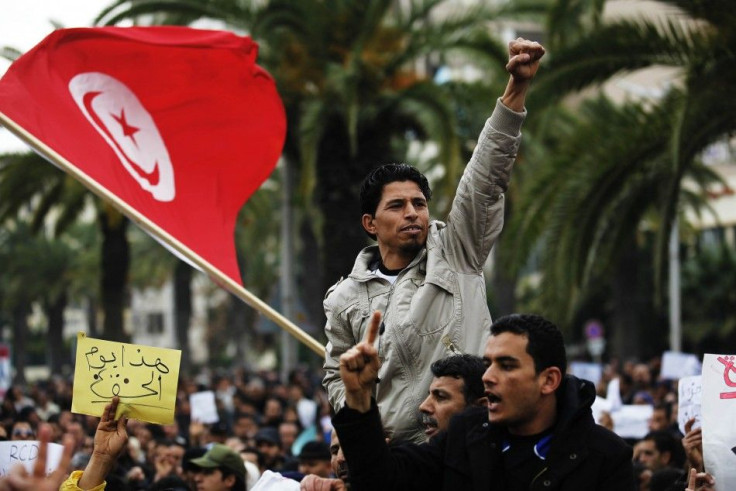Tunisia Still Has Arab Spring In Its Step Despite Religious Protests, Violence
ANALYSIS

On Thursday night, the government of Tunisia imposed a ban on protests that were slated to take place on Friday afternoon.
Several religious groups, led by conservative Islamists of the Salafist movement, had called for the protests to take place after Friday prayers. Activists followed legal protocol by submitting a request to organize a rally at the government headquarters in the capital city of Tunis.
But Interior Ministry spokesman Khaled Tarrouche told Agence-France-Presse that no march has been authorized by the Ministry of the Interior.
Friday prayers are Islamic congregational services, typically held during mid-day. The protests were scheduled to take place right after Friday's gatherings, but several religious groups that had organized the rallies announced on Thursday evening that they would comply with the ban.
As the leaders of Tunisia's jihadist Ansar al-Sharia movement said in a statement, We call on all our brothers to understand this decision and not be carried away by their emotions.
Tarrouche told AFP that public security would be normal throughout the country on Friday, and there are so far no reports of public clashes following the prayers.
There is, however, ongoing unrest in Tunis following a controversial art exhibit, which has fueled religious tensions in the country in recent days. On Tuesday, a protest broke out during which Salafist activists threw small bombs at official buildings, blocked busy thoroughfares and set tires aflame. They were demonstrating against an art exhibit in the wealthy suburb of La Marsa, which they said insulted Islam.
The works on display included a painting showing a woman's naked torso, statuettes of women in hijabs who appeared to be submerged waist-deep in a circle of rocks, and an installation in which plastic ants were arranged on canvas to spell Allah is great in Arabic.
The protest spread quickly to other cities in Tunisia and was joined by many youths who were not Salafist but said they were participating for religious reasons. Some Tunisian bloggers said that the protesters seemed to be comprised entirely of unaffiliated youths. Amid the turmoil, one person died and at least 100 more were wounded.
Friday's protests would have been a continuation of this reactionary movement.
In that context, the Tunisian government's decision to ban the rallies was a gamble -- but it seems to have paid off. With the cooperation of Salafist groups, a potentially violent conflict has been avoided.
This is encouraging, especially considering Tunisia's important role as a leader in the Arab Spring. The nation's failures, successes and policies will set a precedent for other Middle Eastern countries in various stages of revolution.
The Arab Spring began in December of 2010 when a produce vendor named Mohamed Bouazizi was mistreated by a police officer. He protested against the government by setting himself aflame in the poor Tunisian village of Sidi Bouzid and died in a hospital in January.
In his honor, protesters rallied all over the country in attempts to put an end to the oppressive secular administration of then-President Zine el-Abidine Ben Ali, who was overthrown within 28 days in what became known as the Jasmine Revolution.
Since then, the new government has worked to implement policies that do not exacerbate divisions between moderate Muslims, conservative Islamists and liberal secularists. Ennahda, a moderate Islamist party that was banned under Ben Ali, won a plurality of parliamentary seats in free elections after the overthrow. This has been a cause for concern to secularists, but some of their fears were allayed when party officials asserted in March that the Tunisian constitution would not be based on Sharia law.
For this government, forming and implementing the country's new policies has been a constant balancing act. This was evinced by their reaction to this week's protests; in a statement, they took pains to censure the artwork while also condemning the protesters.
Freedom of expression, said the statement, is not absolute since religious symbols should be respected -- on the other hand, the ensuing violence was unwarranted. Ennahda then cited the need to open a criminal investigation and to prosecute all those who are found to be involved in the violation of the sacred and the destruction of property.
So far, a curfew has been called, and more than 160 people have been arrested. But Friday's relative calm shows that although the situation is certainly worrisome, it is far from dire.
The fact is, Tunisia has some unique advantages as it cobbles together a new national identity, especially compared to other countries that have seen Arab Spring revolutions. Notwithstanding oppression and corruption under Ben Ali, citizens in Tunisia are well-educated and socially liberal. They have a healthy middle class, a good reputation for gender equality and a demographically cohesive population whose divisions are primarily ideological.
Even following this week's violence, the citizens of Tunis remain fairly optimistic about their country's continuing progress, according to Tunisia Live.
Mene Lamjed, a local cab driver, compared his country to other democracies around the world. In all revolutions, like in Spain, it takes five years to develop the country. We have had only six months with this government. Tunisia is OK. ... We will succeed, because we do not have major problems, he said.
© Copyright IBTimes 2024. All rights reserved.






















